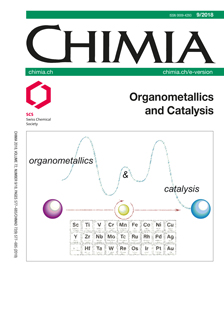Selectivity in Transition Metal-catalyzed Cyclizations: Insights from Experiment and Theory
DOI:
https://doi.org/10.2533/chimia.2018.614Keywords:
Cycloisomerization, Mechanistic study, Selectivity, Theoretical analysis, Transition metal catalysisAbstract
Transition metal-catalyzed cycloisomerization reactions offer a powerful tool for the synthesis of complex cyclic organic molecules from acyclic precursors. In addition to ring formation, these processes can result in the generation of new stereocentres at the site of ring formation; understanding the origins of stereoselectivity enables the use of cycloisomerization chemistry in synthesis, and promotes the design of new reactions. In this article, some recent developments from our groups in regio- and stereoselective cycloisomerization reactions are discussed. Alongside experimental observations, crucial to developing a robust understanding of selectivity has been the use of computation to explore theoretical reaction pathways, which provides an exceptional level of insight into selectivity. In its most valuable form, this correlation between experiment and theory enables the design of improved catalyst systems exhibiting both enhanced reactivity, and selectivity.Downloads
Published
2018-09-01
Issue
Section
Scientific Articles
License
Copyright (c) 2018 Swiss Chemical Society

This work is licensed under a Creative Commons Attribution-NonCommercial 4.0 International License.
How to Cite
[1]
E. A. Anderson, R. S. Paton, Chimia 2018, 72, 614, DOI: 10.2533/chimia.2018.614.







